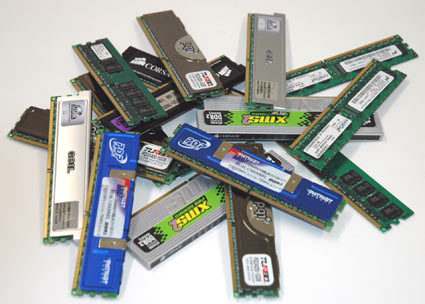Tight Timings vs High Clock Frequencies
Benchmark Conclusions
We conclude the following from our testing:
- There are very small real-life differences in performance between low clock frequency/fast timing Winbond memory and high clock frequency/relaxed timing Samsung memory. This is true in 3DMark01 and SuperPI even for CPU/memory intensive applications.
- To accurately answer the question we asked earlier in this article - namely, whether to go for tight timings or high clock frequencies - one should conduct the tests using a very fast CPU to eliminate bottlenecks. It is our opinion that even our overclocked 2610 MHz dual core Opteron wasn't really fast enough to do more than hint at a possible victory for tight timings at even higher CPU clock frequencies.
- Given the two facts above, our conclusion must be that our testing using only Samsung memory and extrapolation, instead of comparison to actual Winbond memory, does not result in data accurate enough to give an entirely foolproof answer. According to our calculations, the difference between CL2.0-2-2-6 at 270 MHz and CL3.0-4-4-7 at 320 MHz in SuperPI 8M swayed from 0.7% to 0.5% in both directions, depending on how performance scales.
- Testing indicated that tight timings become more important as CPU clock is raised. This could potentially lead to Winbond memory performing 1-2% better than Samsung memory at Athlon 64/Opteron CPU speeds over 3 GHz. Of course, Winbond is no longer an active player on the DDR1 market, so getting a hold of this kind of memory is so hard that the issue becomes moot.
- Depending on CPU clock frequency, tight timings have a performance advantage over relaxed timings in CPU/memory intensive applications, ranging from 2% at 2 GHz to 6% at 2.6 GHz.
- When leaving the timings untouched at a CPU clock of 2 GHz or 2.6 GHz respectively, DDR600 performs 2% or 5% better than DDR400 in CPU/memory intensive applications.
- For Samsung TCC5/TCCD memory, like the G.Skill F1-4400DSU2-1 GBFC used for this article, DDR600 at medium timings outperforms DDR400 at tight timings. DDR600 at relaxed timings performs about the same as DDR400 at tight timings (+/- 1%).
Final Conclusion
Unfortunately, we are limited in the conclusions we can draw from this article. We could of course follow up on the article by testing with a faster CPU and some Winbond memory. However, Winbond's high voltage memory chip series is discontinued, the performance difference seems to be miniscule, the transition to 2x 1 GB memory sticks is in progress, and AMD will soon introduce DDR2. Given all of these factors, it wouldn't make much sense to bother.
For the majority of users, the 1-2% benefit in performance when comparing Winbond to Samsung memory will go unnoticed. In fact, we would not advise anyone to spend a lot of money on highest end memory in the hope of improving computer performance by increasing memory speed. As noted earlier in the article, keeping the timings unchanged and at a steady CPU clock of 2.6 GHz, DDR600 performs 5% better than DDR400 in CPU/memory intensive applications. These are very weak gains given that there is a 50% increase in memory speed, and these gains are even smaller at lower CPU speeds. In modern games, which are mostly limited by the graphics card, the performance increase would be zero, as even big changes in CPU speed can go by unnoticed.
The bottom line is that as long as you have enough memory - preferably 2 GB - the extra money you pay for more memory speed would be better invested in a faster graphics card. And if you don't play games, then the CPU and hard drive offer more room for improvement than the memory.
Get Tom's Hardware's best news and in-depth reviews, straight to your inbox.
Current page: Benchmark Conclusions
Prev Page Low Timings Or High Clock Frequencies?, Continued-
jona1 Excellent article. I was looking for a good explanation of memory timings. Thank you (I am from Uruguay, sorry for my bad English :) )Reply -
Good Article I guess. I've been wondering that exact question now that i got 2x1GB of Patriots PC2-8500 Viper Series from NVISION08. The timings are 5-5-5-15 2T at 1066MHz. When i try to lower it 1T it's not reliable. Anyways, thanks tomshardware for another good article, I hope there is a sequel to this, specifically DDR2 or 3 memory.Reply
-
spellbinder2050 ReplyAs most of you are probably aware, the MHz clock speed of the Athlon 64 and Opteron is the product of the HyperTransport speed (HTT) times the multiplier of the CPU.
Correct me if I'm wrong, but shouldn't this be written as, "the MHz clock speed of the Athlon 64 and Opteron is the product of the HyperTransport speed (HTT) and the multiplier of the CPU."
